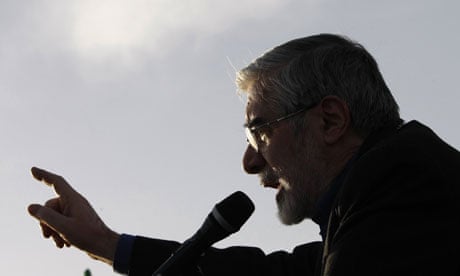Iran's opposition has urged the UN secretary general, Ban Ki-moon, to visit political prisoners and press the regime over its human rights record during a controversial trip to Tehran for a summit of the Non-Aligned Movement this week.
Ban defied calls from America and Israel to boycott the gathering in Iran, the country's biggest international conference in three decades, which will be attended by senior officials from more than 100 nations. Another high-profile participant will be Mohamed Morsi, the first Egyptian president to visit Iran since the 1979 Islamic revolution.
Not far from the summit venue in north Tehran, a number of Iranian activists are behind bars in Tehran's notorious Evin prison. The opposition hopes to use the high-profile visits to highlight the plight of political prisoners, especially the regime's treatment of opposition leaders Mir Hossein Mousavi and Mehdi Karroubi, who have been under house arrest for more than 18 months.
Mousavi, a former presidential candidate, was reported to have been hospitalised for a heart condition last week but was later discharged. He continues to be held under house arrest, with little information disclosed about his health.
"We expect the secretary general to use his status as the highest-ranking UN official to question the Iranian authorities over their treatment of Mr Mousavi, his wife and Mr Karroubi, and request a meeting with them," Ardeshir Amir-Arjomand, a spokesman for Mousavi, told the Guardian.
Meanwhile, a group of Iranian academics and activists have written a letter to the secretary general, calling on him to use his visit to highlight "the dire conditions of human rights" in Iran and meet Mousavi and Karroubi.
"Your imminent visit to Tehran to participate in the upcoming Non-Aligned Movement conference shall provide a unique opportunity to assess the dire conditions of human rights in Iran first hand," said the letter, signed by more than 400 intellectuals. "In the name of humanity and the United Nations charter, [we] appeal to you to intervene for ending the deteriorating conditions of human rights, state-sponsored violence and prejudice in Iran." Activists have made similar requests to the Egyptian president and Indian prime minister, Manmohan Singh.
Ban's spokesman, Martin Nesirky, said he would convey the concerns of the international community. "I can assure you the secretary general fully intends to discuss human rights with the Iranian authorities, including at the highest level," he said.
The British foreign secretary, William Hague, recently condemned Iran's leadership for the "continued, widespread persecution of ethnic minorities, human rights defenders and political prisoners".
"The Iranian government should know that its systematic attempt to curtail the freedom of its citizens will not go unchallenged by the international community and only adds to its isolation," he said on Friday.
At a time of financial stringency caused by western economic sanctions, Iran is using Tehran's summit to defy suggestions that it is being internationally isolated over its disputed nuclear programme. A new report by the International Atomic Energy Agency on the country's nuclear activities is expected to be disclosed later this week.
Iran claims that its nuclear activities are peaceful and it is the victim of a western-led covert campaign against its nuclear scientists. On the sidelines of the summit, Iran has displayed cars wrecked in the assassination of Iranian nuclear scientists and is seeking backing from the members of the movement for its nuclear programme.
Iran's semi-official Fars news agency quoted a senior official, Mohammad Mehdi Zahedi of the parliamentary committee on research and education, as saying that Ban would be asked by Iranian parliamentarian about "the UN's silence" over the assassination of Iranian scientists.
Legacy of imperialism and the cold war
The Non-Aligned Movement has its roots in the depths of the cold war. Its founding principles emerged from a meeting in Bandung, Indonesia, in 1955, when leaders of developing countries attempted to chart an alternative path to taking sides in the all-consuming rivalry between the West and the Soviet Union.
Its founders included champions of the struggle against colonialism: Suharno of Indonesia, Kwame Nkrumah of Ghana, and Jawaharlal Nehru of India, as well Gamal Abdul Nasser of Egypt and Josip Broz Tito of what was then Yugoslavia. It was Tito, anxious to underline his independence from Moscow, who hosted the first formal summit in Belgrade in 1961.
The collapse of Yugoslavia in the early nineties crystallised the NAM's dilemma over what it stood for in a post-cold war world. The disconnect between the Bandung principles, such as respect for human rights and the United Nations charter, and the behaviour of many of the major member states had been apparent long before.
In recent years it has recast itself as a force pushing for redistribution of global wealth and power from the rich north to a poor south, working alongside the Group of 77 developing countries at the UN, for fairer structures in international institutions, particularly the UN security council.
The 2003 invasion of Iraq gave the movement new vigour, as opposition to the excesses of the "war on terror" became a rallying point, rekindling bitter memories of imperialism. The NAM represents an important bloc on the board of the International Atomic Energy Agency (IAEA), where its members have resisted pressure on Iran, portraying it as bullying by the established nuclear powers. However, it lost an important test of strength with the US and its allies in the vote for a new IAEA director general in 2009, when Washington's preferred candidate, Yukiya Amano, beat South Africa's Abdul Minty. The large turnout of NAM leaders this week in Tehran can be seen in part as a backlash to that defeat, and a gesture of defiance in Iran's defence against western sanctions and the threat of an Israeli attack.
Julian Borger
